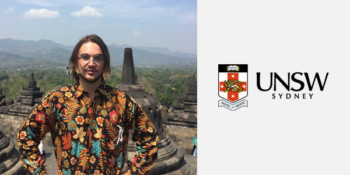Adam Hegedus is a 2019 New Colombo Plan Scholar from University of New South Wales. Adam undertook the Development Studies Immersion Program at Universitas Gadjah Mada in Semester 2, 2019.
Q: Why did you decide to undertake ACICIS’ Development Studies Immersion Program (DSIP) ?
DSIP is a culturally immersive program that has enabled and empowered me to extensively engage with Indonesia’s development and gain a foundational knowledge of key priority areas from both a policy and grassroots perspective. This course is unique in that it provides language and community-engagement initiatives that strengthen people-to-people relationships and do so in a way that is meaningful. The ACICIS DSIP program is also renowned for engaging highly motivated, dedicated and socially conscious people that have helped me transform my own values and ideas about development.
On a practical note, I choose DSIP as it challenged and complimented my learning as a Bachelor of Commerce student with a dual major in Management and Information Systems.
This was from the recommendation of another Commerce student at UNSW, who was correct in that it has broadened my employment and career opportunities, as well as being able to explore a new culture and gain positive life-changing experiences. It is also a fantastic cultural and social opportunity, where you have the opportunity to travel and richly connect with the plethora of sub-cultures that Java and Indonesia have to offer.
Q: Did you receive a New Colombo Plan Mobility Grant? If so, how did this contribute to your experience in Indonesia?
I was awarded the New Colombo Plan Scholarship 2019, which is a leadership and career development opportunity for up to 18 months within the Indo-Pacific region. The NCP Scholarship provided me the support my extracurricular activities, travel copiously and engage with cultural events and festivities. Further, it allowed me to focus on my language studies too, with training at Wisma Bahasa that supported my confidence and ability to apply Bahasa Indonesian in the workplace.
Q: How will the DSIP influence your future career or study?
As a Commerce student, I am grateful for the opportunity to have undertaken a Development Studies Exchange Program that is complementary and diverse to my current program. This academic introduction has inspired me to seek further studies in the field of International Development and Governance. I also value the importance of language, culture, religion, social structures and cultural immersion in the process of development and will always take these steps as I progress in my career.
Q: How does development in Indonesia differ to what you’ve seen before?
My experiences in development have been gained in Timor-Leste over the last 5 years, with my not-for-profit Educating The Future, where we construct public pre-schools in regional and remote areas. Given that I was able to research early childhood infrastructure and education programs, I discovered differences in the service-models employed, public-private-community relationships, engagement with development partners and sector priorities. This is particularly important as Indonesia is composed of a myriad of diverse sub-cultures, religions, community structures and it is geographically distant. Thus, through my research and work experiences, I was fortunate to learn about initiatives that have been effective and others that have not been and this has helped me develop a more worldly frame of reference as I pursue a development career.
Q: What do you like to do in your spare time in Yogyakarta?
Cultural immersion! This involved all sorts of activities from makan bersama, football, sporting events, and travel, commonly known as ‘jalan-jalan’. At the start of my DSIP Program, I set a goal to travel almost every weekend when I had the time, particularly with a group or new group of friends, including a mix of bule and Indonesian students. A group of us also committed to further informal language training after work hours in establishments such as Platinum, which helped to understand sub-cultures, youth perspectives on contemporary issues and engage in culturally appropriate topical discussions.
Q: Are you undertaking an internship or student community service (KKN) while in Indonesia?
I completed an 8-week full-time internship with Project Child Indonesia located in Yogyakarta and Pacitan. This was an opportunity for me to gain invaluable work experience in Indonesia and learn about Indonesian and Javanese work-culture, particularly in relation to early childhood education. During my time, I facilitated a 2-day strategy workshop with key staff (in predominantly) Bahasa Indonesia, supporting decisions to redesign their mission, vision, and activities to align more closely with their intended outcomes and funding opportunities. It was also a great way to make life-long friends and learn from experts in the early childhood development industry.
Q: Favourite Indonesian food/place to eat:
Jalan Kaliurang delivers the goods (literally GoFood)! Amongst close competition, Lesehan Aldan definitely deserves all the patronage it can get. With second to none service and a great selection of food and drink (and never ‘habis’), this is the place to go! Closely followed by Rempah Asia, Special Sambal, Seafood 99 and Cubic Kitchen and Bar (recommended for cultural immersion, particularly after work-hours!).
Q: Favourite Indonesian word/phrase:
Matur Nuwun (Bahasa Jawa untuk terima kasih).
Q: What places in Indonesia have you visited during your Semester so far?
Bali; Canggu, Uluwatu and Nusa Dua, Sumatera; Bandar Lampung, Jakarta, Pacitan, Gunung Bromo, Gunung Rinjani, Lombok, Gili Trawangan, Labuan Bajo, Dieng Plateau, Parangtritis and Surabaya!
And I know there is still so much left that I haven’t had the time to see just yet – nanti, tentu saja!


